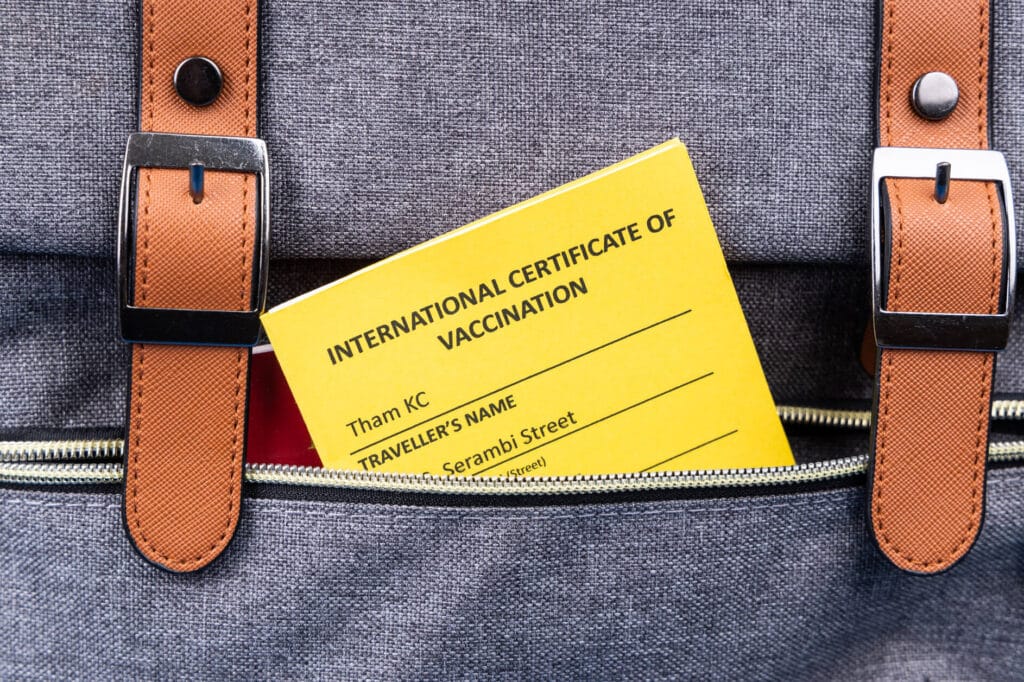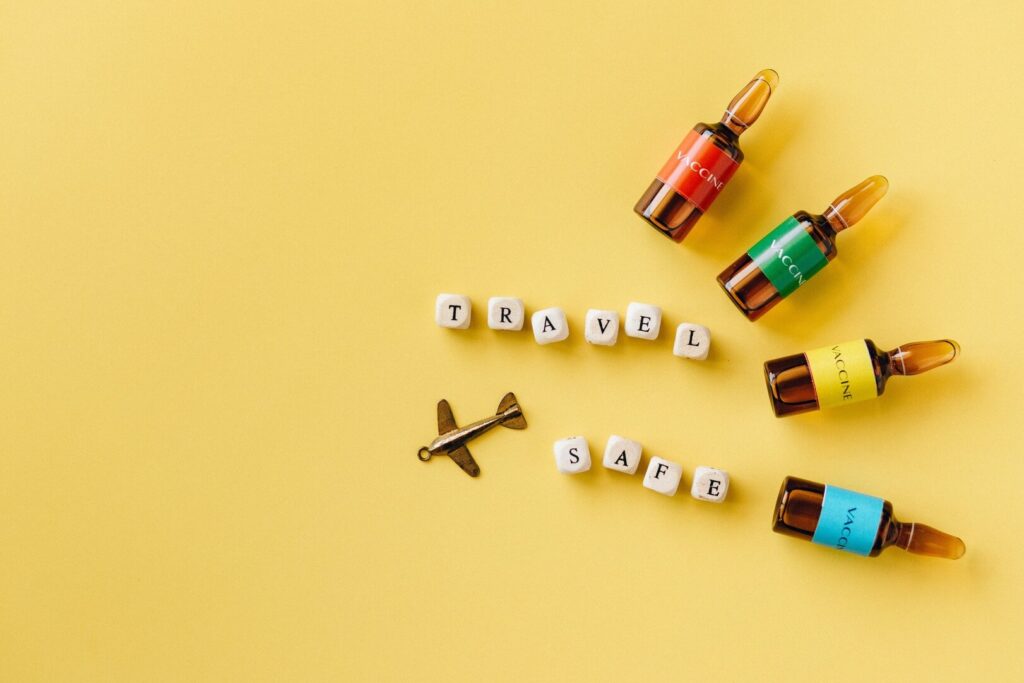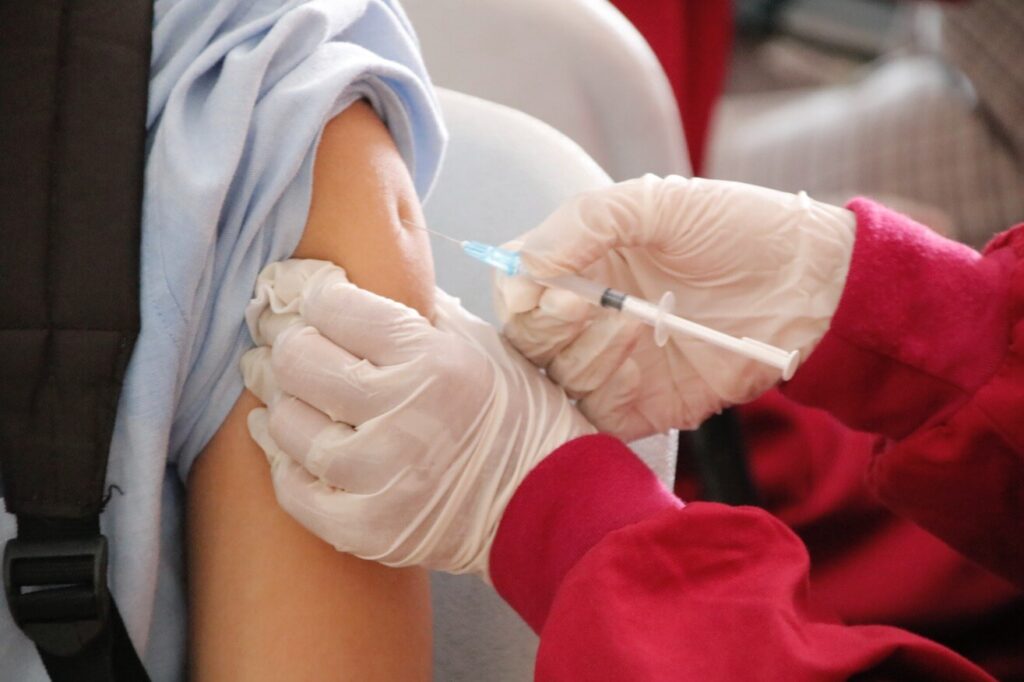Going off on a new adventure is always exciting. But in today’s world, the concept of travel has taken on a new dimension: vaccine-ready travel. So we created a travel vaccine guide that covers every aspect of vaccine requirements for travel.
As we collectively strive for global health and safety, it’s important to understand the significance of proper vaccinations in our travel plans.
This blog post aims to be your compass – and guide you on everything you need to know about vaccine requirements for travel.
Let’s jump straight in!

What Are the Potential Risks of Traveling Without Proper Vaccinations?
Before you dust off your suitcase, it’s important to know the potential risks associated with traveling unvaccinated. Here’s a quick glance at some:
- Health compromises: Without vaccinations you expose yourself to a higher risk of contracting and spreading preventable diseases.
- Community vulnerability: Unvaccinated travelers contribute to the transmission of diseases and put communities at risk.
- Travel disruptions: Many destinations now require proof of vaccination. This means if you don’t meet the vaccine requirements for travel it could lead to delays, quarantines, or even denial of entry.
- Incurring medical expenses: Treating a vaccine-preventable disease can be expensive. And travelers who aren’t vaccinated may be responsible for their own medical care.
Vaccinations and Their Role in Global Health
In this dynamic travel landscape, vaccinations act as a frontline defense against preventable health threats.
Beyond individual protection, they also play an important role in safeguarding the well-being of communities worldwide. Ensuring you are vaccine-ready secures not just your own health, but contributes to a global effort for safer and healthier travels for everyone.
Next, let’s get into the essentials that pave the way to vaccine-ready adventures.

Vaccine Requirements for Travel & Navigating Global Guidelines
Understanding the International Health Regulations (IHR)
Today, international travel is more common than ever. This is why it’s crucial to have a system in place to protect public health. That’s where the International Health Regulations (IHR) come in.
As far as travel vaccination guides go – this is it.
Let’s break it down:
- The IHR is essentially a set of international guidelines outlining how countries should respond to public health emergencies.
- One of its key aspects is the requirement for countries to report certain health events to the World Health Organization (WHO).
- This information is used to assess the risk of an outbreak and determine whether a public health emergency should be declared.
- In addition to reporting requirements, the IHR also recommend specific vaccinations for travelers – based on the risk of infectious diseases. For example, travelers to certain countries in Africa and South America may be required to have proof of vaccination against yellow fever.
The IHR are regularly reviewed and updated to reflect the latest scientific evidence and to keep up with the evolving threat of infectious diseases. By following the IHR, countries help prevent the spread of disease and protect the health of their citizens and visitors alike.
Some key benefits of the IHR:
- Improved communication and coordination between countries
- Earlier detection and response to public health emergencies
- Reduced risk of international disease spread
- Protecting the health of travelers and communities

Vaccination Requirements for Travel by Location
Next in our travel vaccination guide is understanding which destinations mandate specific immunizations for entry. Here’s a comprehensive overview of countries requiring specific vaccinations (as well as recommended vaccinations), categorized by region:
Please note that a yellow fever inoculation is required for those who pass through the yellow fever belt of Africa, South America, or Asia. Otherwise, as far as vaccination requirements for travel go – the rest are all based off The Centers for Disease Control and Prevention (CDC)’s recommendations.
Africa
As part of current vaccine requirements for travel, travelers need to get vaccinated for yellow fever if they’re planning on traveling to the following African countries.
Yellow Fever: Angola, Benin, Burkina Faso, Burundi, Cameroon, Central African Republic, Chad, Congo, Côte d’Ivoire, Democratic Republic of the Congo, Equatorial Guinea, Ethiopia, Gabon, Gambia, Ghana, Guinea, Guinea-Bissau, Kenya, Liberia, Malawi, Mali, Mauritania, Niger, Nigeria, Republic of the Congo, Rwanda, São Tomé and Príncipe, Senegal, Sierra Leone, South Sudan, Sudan, Togo, Uganda, Zambia
Recommended Vaccinations:
- Chickenpox (varicella): Recommended for all travelers, especially those at risk of severe illness.
- Diphtheria, Tetanus, and Pertussis (DTP): Recommended for all travelers, especially those who have not been vaccinated or whose vaccinations are not up-to-date.
- Hepatitis A: Recommended for all travelers, especially those visiting rural areas or who may have contact with contaminated food or water.
- Hepatitis B: Recommended for travelers who may have contact with blood or bodily fluids, such as healthcare workers or those who plan to get tattoos or piercings.
- Meningitis: Recommended for travelers to areas where meningococcal meningitis is common, such as Burkina Faso, Cameroon, Chad, Central African Republic, Côte d’Ivoire, Ethiopia, Ghana, Mali, Mauritania, Niger, Nigeria, and Saudi Arabia (travelers to Hajj and Umrah).
- Rabies: Recommended for travelers who may be exposed to wild animals, such as bats, monkeys, and dogs.
- Typhoid: Recommended for travelers who may have contact with contaminated food or water, especially those visiting rural areas.
Asia
As part of current vaccine requirements for travel, travelers need to get vaccinated for yellow fever if they’re planning on traveling to the following Asian countries.
Yellow Fever: Indonesia (Bali and Lombok), Malaysia, Thailand
Recommended Vaccinations:
- Chickenpox (varicella): Recommended for all travelers, especially those at risk of severe illness.
- Diphtheria, Tetanus, and Pertussis (DTP): Recommended for all travelers, especially those who have not been vaccinated or whose vaccinations are not up-to-date.
- Hepatitis A: Recommended for all travelers, especially those visiting rural areas or who may have contact with contaminated food or water.
- Hepatitis B: Recommended for travelers who may have contact with blood or bodily fluids, such as healthcare workers or those who plan to get tattoos or piercings.
- Japanese Encephalitis: Recommended for travelers to rural areas in countries where the virus is prevalent, such as Cambodia, India, Indonesia, Malaysia, Nepal, Sri Lanka, Thailand, and Vietnam.
- Meningitis: Recommended for travelers to areas where meningococcal meningitis is common, such as Nepal and Pakistan.
- Rabies: Recommended for travelers who may be exposed to wild animals, such as bats, monkeys, and dogs.
- Typhoid: Recommended for travelers who may have contact with contaminated food or water, especially those visiting rural areas.
Europe
Recommended Vaccinations:
- Chickenpox (varicella): Recommended for all travelers, especially those at risk of severe illness.
- Diphtheria, Tetanus, and Pertussis (DTP): Recommended for all travelers, especially those who have not been vaccinated or whose vaccinations are not up-to-date.
- Hepatitis A: Recommended for travelers who may have contact with contaminated food or water, especially those visiting rural areas.
- Hepatitis B: Recommended for travelers who may have contact with blood or bodily fluids, such as healthcare workers or those who plan to get tattoos or piercings.
- Measles, Mumps, and Rubella (MMR): Recommended for all travelers, especially those who have not been vaccinated or whose vaccinations are not up-to-date.
- Pneumococcal: Recommended for travelers who are 65 years of age or older, as well as those with certain medical conditions, such as heart disease, diabetes, or chronic lung disease.
- Shingles: Recommended for adults 50 years of age or older.
Oceania
Recommended Vaccinations:
- Chickenpox (varicella): Recommended for all travelers, especially those at risk of severe illness.
- Diphtheria, Tetanus, and Pertussis (DTP): Recommended for all travelers, especially those who have not been vaccinated or whose vaccinations are not up-to-date.
- Hepatitis A: Recommended for travelers who may have contact with contaminated food or water, especially those visiting rural areas.
- Hepatitis B: Recommended for travelers who may have contact with blood or bodily fluids, such as healthcare workers or those who plan to get tattoos or piercings.
- Measles, Mumps, and Rubella (MMR): Recommended for all travelers, especially those who have not been vaccinated or whose vaccinations are not up-to-date.
- Pneumococcal: Recommended for travelers who are 65 years of age or older, as well as those with certain medical conditions, such as heart disease, diabetes, or chronic lung disease.
- Shingles: Recommended for adults 50 years of age or older.
North America
Recommended Vaccinations:
- Chickenpox (varicella): Recommended for all travelers, especially those at risk of severe illness.
- Diphtheria, Tetanus, and Pertussis (DTP): Recommended for all travelers, especially those who have not been vaccinated or whose vaccinations are not up-to-date.
- Hepatitis A: Recommended for travelers who may have contact with contaminated food or water, especially those visiting rural areas.
- Hepatitis B: Recommended for travelers who may have contact with blood or bodily fluids, such as healthcare workers or those who plan to get tattoos or piercings.
- Measles, Mumps, and Rubella (MMR): Recommended for all travelers, especially those who have not been vaccinated or whose vaccinations are not up-to-date.
- Pneumococcal: Recommended for travelers who are 65 years of age or older, as well as those with certain medical conditions, such as heart disease, diabetes, or chronic lung disease.
- Shingles: Recommended for adults 50 years of age or older.
Additional Considerations:
- Malaria: While malaria is not endemic in most parts of North America, it can be found in certain regions, such as the Dominican Republic, Haiti, and Mexico. Travelers to these areas should take steps to prevent mosquito bites, such as using insect repellent and wearing long sleeves and pants at night. Anti-malarial medication may also be recommended.
- Travelers’ diarrhea: Travelers’ diarrhea is a common problem that can be caused by bacteria, viruses, or parasites. To prevent travelers’ diarrhea, it is important to eat only safe food and water, and to practice good hygiene.
South America
Yellow Fever: Bolivia, Brazil, Colombia, Ecuador, Guyana, Peru, Suriname, Venezuela
Recommended Vaccinations:
- Chickenpox (varicella): Recommended for all travelers, especially those at risk of severe illness.
- Diphtheria, Tetanus, and Pertussis (DTP): Recommended for all travelers, especially those who have not been vaccinated or whose vaccinations are not up-to-date.
- Hepatitis A: Recommended for all travelers, especially those visiting rural areas or who may have contact with contaminated food or water.
- Hepatitis B: Recommended for travelers who may have contact with blood or bodily fluids, such as healthcare workers or those who plan to get tattoos or piercings.
- Japanese Encephalitis: Recommended for travelers to rural areas in countries where the virus is prevalent, such as Bolivia, Brazil, Ecuador, Paraguay, Peru, and Venezuela.
- Meningitis: Recommended for travelers to areas where meningococcal meningitis is common, such as Argentina, Bolivia, Brazil, Chile, Colombia, Ecuador, Paraguay, Peru, and Venezuela.
- Rabies: Recommended for travelers who may be exposed to wild animals, such as bats, monkeys, and dogs.
- Typhoid: Recommended for travelers who may have contact with contaminated food or water, especially those visiting rural areas.
Additional Considerations:
- Polio: While polio is no longer endemic in most countries, it is still a risk in some parts of the world. All travelers to countries where polio is a risk should be vaccinated against polio, regardless of their age or vaccination history.
- Malaria: Malaria is a serious parasitic infection that is transmitted through the bite of an infected mosquito. Travelers to areas where malaria is prevalent should take steps to prevent mosquito bites, such as using insect repellent and wearing long sleeves and pants at night. Anti-malarial medication may also be recommended.
- Travelers’ diarrhea: Travelers’ diarrhea is a common problem that can be caused by bacteria, viruses, or parasites. To prevent travelers’ diarrhea, it is important to eat only safe food and water, and to practice good hygiene.
Please note:
Please also note that this list is not exhaustive and may not include all destinations that require specific vaccinations for entry.
It’s important to always check with local authorities or consulates of your destination country for the most up-to-date information on vaccination requirements for travel.
Additionally, remember that some countries may have additional requirements for travelers based on their age, health status, or travel history.
By staying informed about vaccination requirements for travel, you can enjoy your travels with confidence, knowing that you are taking proactive steps to protect your health and the health of those around you.

Checking Vaccination Requirements
Vaccination requirements for travel can evolve rapidly, making it essential for travelers to stay informed and take proactive steps to protect their health and the health of those around them.
When it comes to travel with vaccines, it’s advised that before embarking on any international journey, you should consider checking with local authorities or consulates for up-to-date and accurate vaccination requirements.
Why is it important to check vaccination requirements before traveling?
- Prevention of infectious diseases: Staying informed of vaccination requirements for travel can help prevent the spread of infectious diseases, protecting both travelers and the communities they visit.
- Compliance with entry regulations: Many countries have specific vaccination requirements for entry, and failure to comply can lead to delays, denied entry, or even quarantine.
- Peace of mind: Knowing that you have taken the necessary precautions to protect your health can provide peace of mind and allow you to focus on enjoying your travels. That’s why we made this travel vaccination guide, so you can travel worry free.
How to Check Vaccination Requirements:
- Consult online resources: The Centers for Disease Control and Prevention (CDC)’s Traveler’s Health website provides comprehensive information on vaccination requirements for destinations around the world.
- Contact local authorities or consulates: The embassies, consulates, or ministries of health of the countries you plan to visit can provide the most up-to-date information on vaccination requirements.
- Consult with your healthcare provider: Your healthcare provider can assess your individual health needs and recommend appropriate vaccinations based on your travel plans.
Remember, staying informed and taking proactive steps to ensure you are up to date on vaccination requirements is an important part of responsible travel.

The Most Common Vaccines for Travelers
When it comes to vaccine-ready travel, it’s important to arm yourself with information.
Our travel vaccine guide does a breakdown of common vaccines that should be on your checklist:
Recommended Vaccines may include:
- Hepatitis A: Shields against a viral liver infection.
- Hepatitis B: Provides long-term protection against hepatitis B infection.
- Japanese Encephalitis: Essential for travel to areas where the virus is prevalent.
- Meningitis: Guards against inflammation of the brain and spinal cord membranes.
- Rabies: Prevents a viral disease transmitted through animal bites.
- Typhoid: Protects against typhoid fever.
- Yellow Fever: Required for travel to certain regions where the disease is endemic.
This should also include the list of complete adult vaccinations for:
- Chickenpox (varicella): Shields against this highly contagious viral infection.
- Diphtheria, Tetanus, and Pertussis (DTP): A trio defense against serious bacterial infections.
- Pneumococcal: Guards against pneumonia and other pneumococcal diseases.
- Measles, Mumps, and Rubella (MMR): A triple threat against three viral infections.
- Polio: Essential in preventing polio, a potentially crippling disease.
- Shingles: Protects against the reactivation of the chickenpox virus.

Is Getting Vaccinated Mandatory?
When it comes to vaccine requirements for travel, The Centers for Disease Control and Prevention (CDC) provides a list of recommended vaccinations for travelers to all parts of the world.
These recommendations are based on the risk of exposure to certain diseases in each region. However, it is important to note that these recommendations are not mandatory. Travelers may choose to decline any or all the recommended vaccinations.
As part of our travel vaccination guide, it’s important to mention that you should consult with your healthcare provider to discuss your vaccination needs before you travel. They will be able to assess your individual risk factors and provide you with personalized recommendations.
Timing of Vaccinations and Post-Vaccination Considerations
General Timeline for Essential Vaccinations:
Here’s a list of the common vaccines and their efficacy timelines:
- Chickenpox (varicella): At least 2 weeks before departure.
- Diphtheria, Tetanus, and Pertussis (DTP): Complete the series, ideally 4-6 weeks before travel.
- Pneumococcal: At least 2 weeks before your journey begins.
- Measles, Mumps, and Rubella (MMR): 2 doses, spaced at least 28 days apart, prior to travel.
- Polio: Completion of the series, with a minimum of 2 weeks before departure.
- Shingles: Ideally 2 to 6 months before travel.
- Hepatitis A: At least 2 weeks before exposure.
- Hepatitis B: Complete the series, allowing time for full efficacy.
- Japanese Encephalitis: Complete the series well in advance of travel.
- Meningitis: At least 7-10 days before potential exposure.
- Rabies: Complete the series, with a buffer before departure.
- Typhoid: 2 weeks prior to potential exposure.
- Yellow Fever: At least 10 days before entering an endemic area.
Why Are Vaccine Series Completion and Efficacy Timelines Important?
Getting a single shot might not be the finish line – and completing vaccine series is crucial for maximum protection. Understanding efficacy timelines ensures your immune system is protected when it matters most.
How Do I Addressing Post-Vaccination Concerns?
It’s normal to have questions about the aftermath of vaccination. Common concerns, like mild reactions or potential side effects, are part of the process. Knowing what to expect empowers you to confidently embark on your vaccine-ready journey. If in doubt, consulting your healthcare provider is always a wise move.
Maintaining Health with Vaccinations
- Prioritize your overall well-being: remember that a healthy traveler is a happy traveler. Beyond vaccinations, taking care of your overall well-being plays a pivotal role in the quality of your travels.
- Practice good hygiene to prevent infection: In the battle against infections, simple practices can be your strongest allies. Regular hand washing becomes your first line of defense, disrupting the potential transmission of germs. Likewise, being mindful of food safety minimizes the risk of foodborne illnesses, ensuring your travel memories are filled with joy, not stomachaches.
- Consult with a healthcare provider if you need to: Your health is unique, and so are your travel needs. Before you embark on your vaccine-ready journey, consult with your healthcare provider. Discuss any health concerns or pre-existing conditions, ensuring you’re well-informed and prepared for a healthy and enjoyable adventure. After all, the best travel stories are the ones written with good health and peace of mind.

Vaccine Passports: Understanding Their Role
What is a Vaccine Passport?
Vaccine passports are digital or paper documents that provide proof of an individual’s vaccination status. They serve as a key to unlocking international borders, facilitating smoother travel by confirming that you’ve received the necessary vaccinations.
Addressing Debates Surrounding Vaccine Passports:
The concept of vaccine passports has sparked debates about individual rights and privacy. While they aim to ensure public safety, concerns have been raised about potential infringements on personal freedoms. Striking a balance between health measures and privacy rights remains a hot topic of discussion and this really comes down to you deciding what’s best for you.
Will We See Global Vaccine Passport Adoption?
So far, several countries have either implemented or are actively considering vaccine passports.
This includes various European nations, the United States, and others.
But keep in mind that the travel landscape is dynamic, with policies always evolving in response to ongoing global situations.
Travel Vaccination Guide For Children
The health and well-being of our little globetrotters is vital. Vaccinations are a cornerstone of preventive healthcare and play a crucial role in protecting children from many infectious diseases.
Why are Vaccinations Important for Children?
Children’s immune systems are still developing, making them more susceptible to infectious diseases.
Vaccinations offer a proactive shield against these illnesses, not only protecting children from potential health complications but also preventing the spread of diseases to other vulnerable populations – including younger children, pregnant women, and individuals with compromised immune systems.
Vaccination schedules and recommendations:
To effectively protect children, adhering to age-appropriate vaccination schedules is essential.
The Centers for Disease Control and Prevention (CDC) provides comprehensive guidelines for childhood vaccinations, outlining the recommended immunizations and their administration timelines.
These schedules are carefully designed to provide optimal protection at crucial stages of a child’s development.
Tips for Planning Trips with Vaccinated Children
When planning international trips with vaccinated children, parents should consider the following steps:
- Schedule a Visit with Your Child’s Healthcare Provider: Consult your child’s pediatrician or family doctor to review their vaccination records and ensure they are up-to-date on all recommended immunizations.
- Check Vaccination Requirements for Travel: Familiarize yourself with the specific vaccination requirements for the countries you plan to visit. Some destinations may mandate additional vaccinations for children depending on their age and travel history.
- Plan Ahead for Potential Immunization Reactions: While rare, mild side effects, such as soreness at the injection site or low-grade fever, can occur after vaccinations. Being prepared for these reactions can help ease any discomfort your child may experience.
- Read Resources and Guidance for Parents: Numerous resources are available to help parents navigate the world of childhood vaccinations and prepare for international travel:
- CDC Traveler’s Health Website: This comprehensive resource provides detailed information on vaccination requirements for specific destinations, along with general travel health recommendations.
- Your Child’s Healthcare Provider: Consult your child’s pediatrician or family doctor for personalized advice and guidance on vaccinations and travel health.
- Children’s Advocacy Organizations: Organizations like the American Academy of Pediatrics and the Children’s Hospital Association offer valuable information and support for parents on child health and safety, including vaccinations and travel.
Want to Experience the World Worry-Free?
Air Doctor is a must-have app for travelers since it provides them with peace of mind.
Travelers know they can access quality medical care, anywhere, anytime – and use the Air Doctor app to find a local doctor near them, get treated, and travel worry free.
Download the Air Doctor App on the App Store or Google Play, or visit the website and use the web app to find a local doctor near you now!
Travel can be stressful.













